
The Uyghurs, alternatively spelled Uighurs, Uygurs or Uigurs, are a Turkic ethnic group originating from and culturally affiliated with the general region of Central and East Asia. The Uyghurs are recognized as the titular nationality of the Xinjiang Uyghur Autonomous Region in Northwest China. They are one of China's 55 officially recognized ethnic minorities. The Uyghurs are recognized by the Chinese government as a regional minority and the titular people of Xinjiang.
Human rights in China are periodically reviewed by international bodies, such as human rights treaty bodies and the United Nations Human Rights Council's Universal Periodic Review. The Chinese Communist Party (CCP), the government of the People's Republic of China (PRC), their supporters, and other proponents claim that existing policies and enforcement measures are sufficient to guard against human rights abuses. However, other countries, international non-governmental organizations (NGOs) including Human Rights in China and Amnesty International, and citizens, lawyers, and dissidents inside the country, state that the authorities in mainland China regularly sanction or organize such abuses.
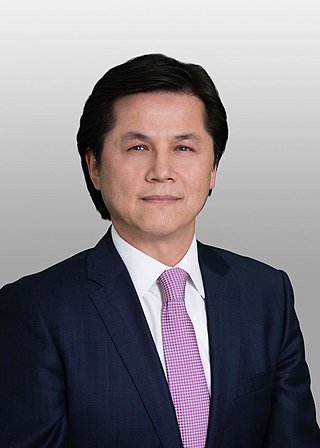
Nury Ablikim Turkel is an American attorney, public official and human rights advocate based in Washington, D.C. He is a former chair of the Uyghur Human Rights Project, former chair of the United States Commission on International Religious Freedom, and former president of the Uyghur American Association.
Racism in China arises from Chinese history, nationalism, sinicization, and other factors. Racism in the People's Republic of China has been documented in numerous situations. Ethnic tensions have led to numerous incidents in the country such as the Xinjiang conflict, the ongoing internment and state persecution of Uyghurs and other ethnic minorities, the 2010 Tibetan language protest, the 2020 Inner Mongolia protests, discrimination against Africans in particular and discrimination against Black people in general.

Crimes against humanity under communist regimes occurred during the 20th century, and they included forced deportations, massacres, torture, forced disappearances, extrajudicial killings, political terrorization campaigns, ethnic cleansing, and enslavement, as well as the deliberate starvation of people. Additional events included the commition of genocide, conspiracy to commit genocide, and complicity in genocide. Such events have been described as crimes against humanity.
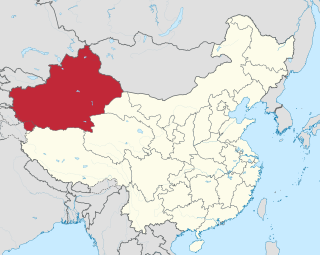
The Xinjiang conflict, also known as the East Turkistan conflict, Uyghur–Chinese conflict or Sino-East Turkistan conflict, is an ongoing ethnic geopolitical conflict in what is now China's far-northwest autonomous region of Xinjiang, also known as East Turkistan. It is centred around the Uyghurs, a Turkic ethnic group who constitute a plurality of the region's population.
The East Turkistan National Movement also known as the East Turkistan National Awakening Movement is a non-profit human rights and political advocacy organization established in June 2017 in Washington D.C. Salih Hudayar, a Uyghur American consultant and graduate student founded the group after pre-existing Uyghur organizations failed to openly call for East Turkestan independence deeming it "controversial".

The Xinjiang internment camps, officially called vocational education and training centers by the government of China, are internment camps operated by the government of Xinjiang and the Chinese Communist Party Provincial Standing Committee. Human Rights Watch says that they have been used to indoctrinate Uyghurs and other Muslims since 2017 as part of a "people's war on terror", a policy announced in 2014. The camps have been criticized by the governments of many countries and human rights organizations for alleged human rights abuses, including mistreatment, rape, and torture, with some of them alleging genocide. Some 40 countries around the world have called on China to respect the human rights of the Uyghur community, including countries such as Canada, Germany, Turkey and Japan. The governments of more than 35 countries have expressed support for China's government. Xinjiang internment camps have been described as "the most extreme example of China's inhumane policies against Uighurs".

The Xinjiang papers are a collection of more than 400 pages of internal Chinese government documents describing the government policy regarding Uyghur Muslims in the Xinjiang region. In November 2019, journalists Austin Ramzy and Chris Buckley at The New York Times broke the story that characterized the documents as "one of the most significant leaks of government papers from inside China's ruling Communist Party in decades." According to The New York Times, the documents were leaked by a source inside the Chinese Communist Party and include a breakdown of how China created and organized the Xinjiang internment camps.

The Chinese government is committing a series of ongoing human rights abuses against Uyghurs and other ethnic and religious minorities in Xinjiang that is often characterized as persecution or as genocide. Beginning in 2014, the Chinese government, under the administration of Chinese Communist Party (CCP) General Secretary Xi Jinping, incarcerated more than an estimated one million Turkic Muslims without any legal process in internment camps. Operations from 2016 to 2021 were led by Xinjiang CCP Secretary Chen Quanguo. It is the largest-scale detention of ethnic and religious minorities since World War II. The Chinese government began to wind down the camps in 2019. Amnesty International states that detainees have been increasingly transferred to the formal penal system.

The Uyghur Human Rights Policy Act of 2020 is a United States federal law that requires various United States government bodies to report on human rights abuses by the Chinese Communist Party (CCP) and the Chinese government against Uyghurs in Xinjiang, China, including internment in the Xinjiang re-education camps.
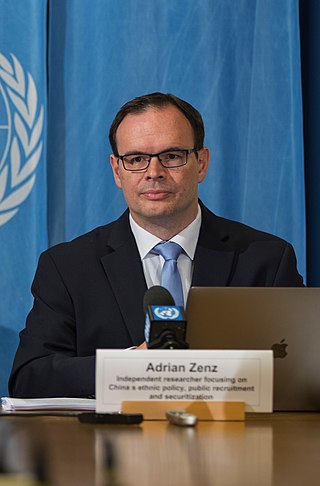
Adrian Nikolaus Zenz is a German anthropologist known for his studies of the Xinjiang internment camps and persecution of Uyghurs in China. He is a director and senior fellow in China studies at the Victims of Communism Memorial Foundation, an anti-communist think tank established by the US government and based in Washington, DC.

Rushan Abbas is a Uyghur American activist and advocate from the Xinjiang Uyghur Autonomous Region in China. She is the founder and executive director of the nonprofit Campaign for Uyghurs. Abbas became one of the most prominent Uyghur voices in international activism following her sister's detainment by the Chinese government in 2018.

Salih Hudayar is a Uyghur-American politician known for advocating for East Turkistan independence. He founded the East Turkistan National Awakening Movement and has since been leading the movement calling for the "restoration of East Turkistan's independence."

Campaign for Uyghurs is a Washington, D.C.-based nonprofit organization. The organization operates to advocate for the democratic rights and freedoms of the Uyghur people, both in the Xinjiang Uyghur Autonomous Region and around the world.

Genocide recognition politics are efforts to have a certain event (re)interpreted as a "genocide" or officially designated as such. Such efforts may occur regardless of whether the event meets the definition of genocide laid out in the 1948 Genocide Convention.
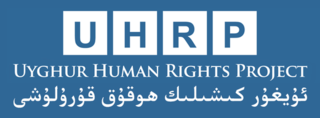
The Uyghur Human Rights Project is a research-based advocacy organization located in Washington, D.C. that promotes human rights for Uyghurs. According to the UHRP, its main goal is "promoting human rights and democracy for Uyghurs and others living in East Turkistan" through research-based advocacy.

The Uyghur Tribunal was an independent "people's tribunal" based in the United Kingdom aiming to examine evidence regarding the ongoing human rights abuses against the Uyghur people by the Government of China and to evaluate whether the abuses constitute genocide under the Genocide Convention. The tribunal was chaired by Geoffrey Nice, the lead prosecutor in the trial of Slobodan Milošević, who announced the creation of the tribunal in September 2020.
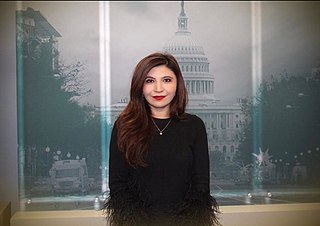
Rayhan Asat is a Uyghur lawyer and human rights advocate. Since 2020, she has led a public campaign for the release of her brother, Ekpar Asat, who has been held in the Xinjiang internment camp system since 2016, and on behalf of the Uyghurs and other ethnic minorities in China. In 2021, she joined the Strategic Litigation Project at the Atlantic Council as a Nonresident Senior Fellow and became a Yale World Fellow. Asat is also a Senior Fellow at the Raoul Wallenberg Centre for Human Rights and President of the American Turkic International Lawyers Association.














